A Better Way to Manage Homebrew Competitions: Interview with Brewerwall
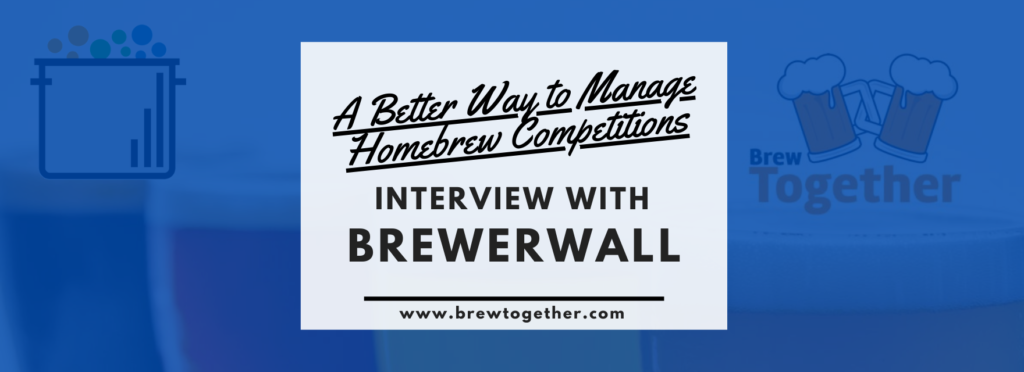

Here’s our interview with our friends at Brewerwall, a new online service that facilitates the hosting, management, and marketing of homebrew competitions!
First, congratulations to Ben on going pro in the brewing/beer industry! That is a common dream among homebrewers, and we’re excited to be sharing his story. Our hope is that others can learn from and be inspired by his experience in this process!
Tell us a little bit about Brewerwall:
Brewerwall is an online service that will facilitate the hosting, management and marketing of home-brew competitions.
How does Brewerwall make creating and managing homebrewing competitions easier or better?
Brewerwall uses a Software as a Service (Sass) model, helps the competition creator with the ease of setup. With Brewerwall, there’s nothing to install. Simply login, register your competition, and allow users to find it and submit their entries. This approach also allows users to view/enter across multiple competitions on the same system. With Brewerwall, there is no more being siloed into a single application for a single competition.
Show us how Brewerwall works!
Login Page
This is the page users will hit first before accessing their account. A simple username/email and password form to login. Options to register will come from this page as well.
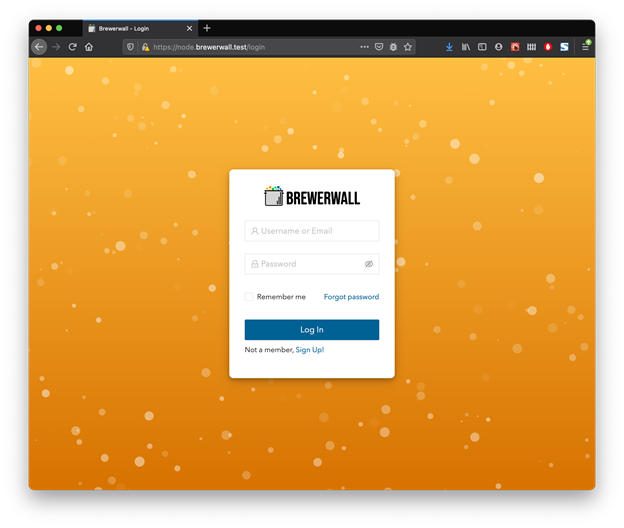

Competition Management
As a competition organizer, you will be able to see all of your active (and eventually, inactive) competitions. These active competitions will be listed out here with some basic information about how your competition is progressing.
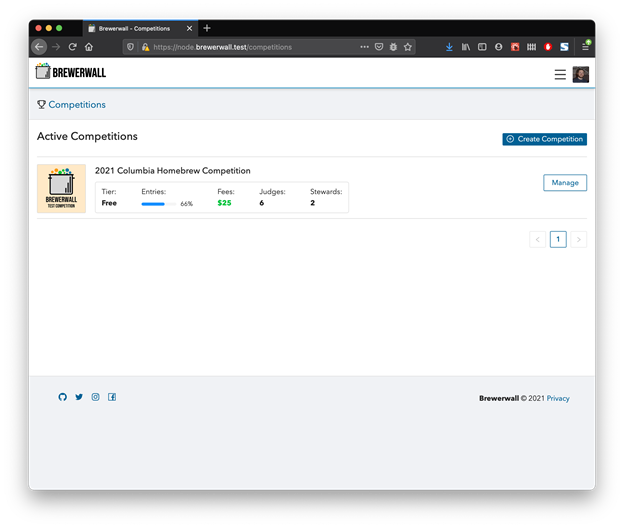

Competition Overview
From the list of active competitions, you can select which competition you want to manage. This will bring you to the competition overview tab, which will give you stats on how your competition is doing. This is also where you can edit competition information, including logo, name, description rules and more!
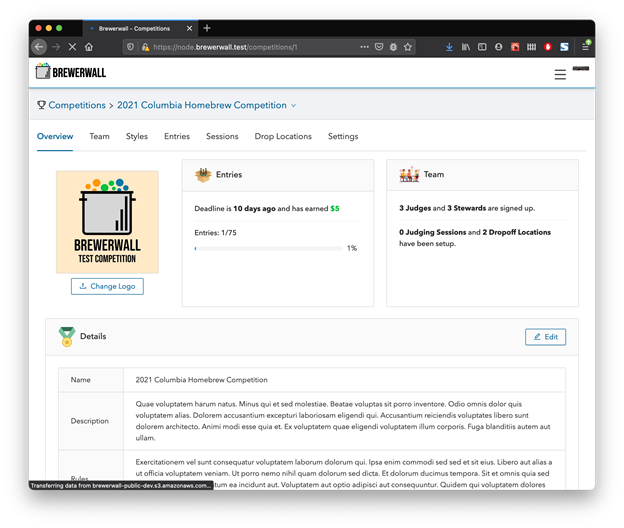

Competition Teams
The teams tab is where you can grow your team. Here you can invite additional organizers, Judges and Stewards. Simply invite them by including their email address and Brewerwall will send out an email to the team member. If the team member already has an account with Brewerwall, great! If not, they will have the opportunity to register.
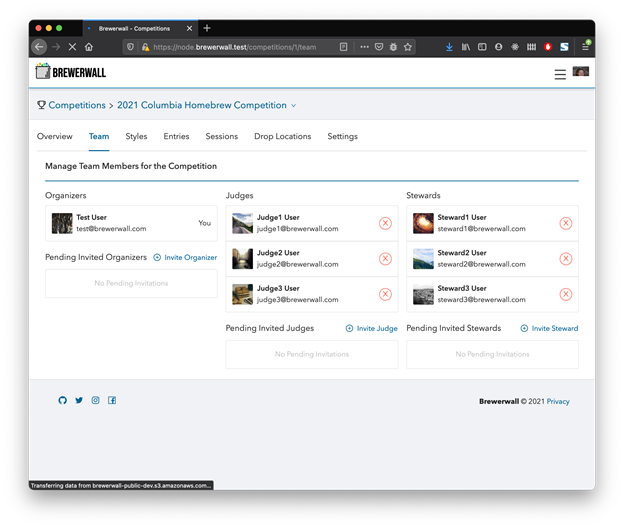

Competition Beer Styles
This is where you can define the Beer Styles that your competition will allow entries of. Currently this includes the BA 2013 and BJCP 2015 definitions. However, this list can grow as new definitions come out.
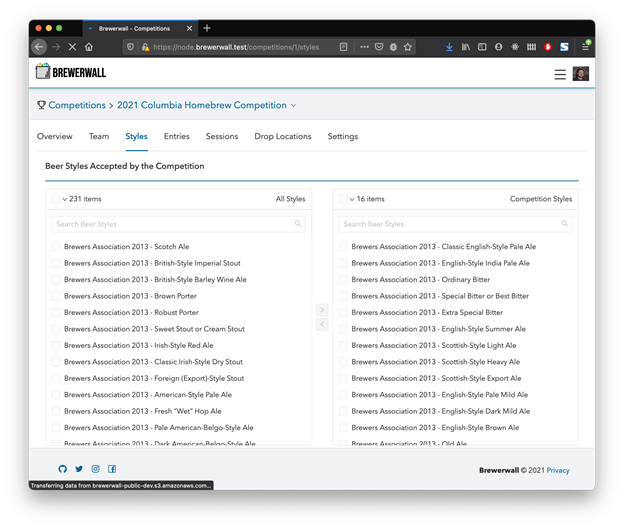

Competition Entries
This tab allows the organizer to manage incoming entries. This includes information about the user who submitted it, the style it includes, the entry name, fees collected and method of payment. This is also the place in which the organizer can mark fees as paid and reconcile entries that have been received. If needed, the organizer can also delete an entry.
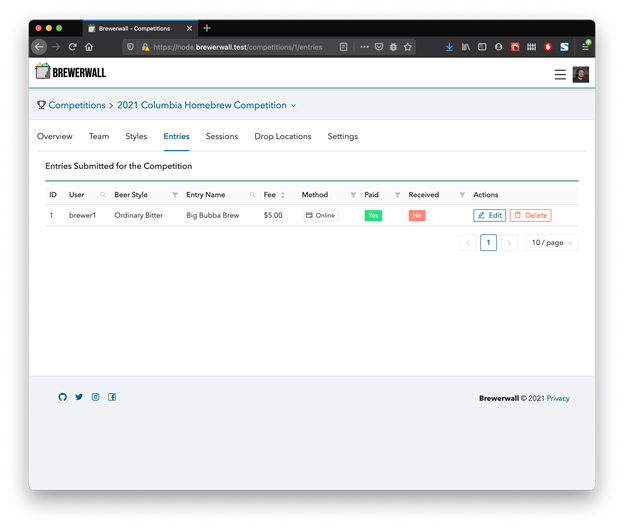

Competition Sessions
A session is a time and place in which a judging will take place. A competition can schedule as many sessions as needed. Once created, you can begin to schedule who from your team will attend, how many tables are involved, flights for each table and the entries within those flights.
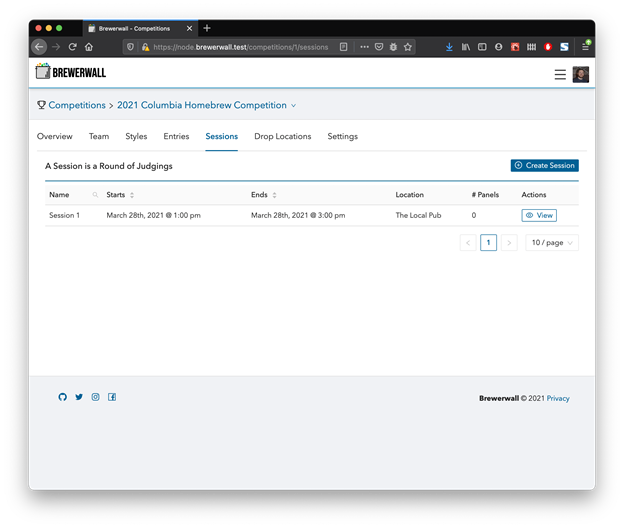

Tell us a little bit about how to organize and manage a homebrewing competition.
Choosing a location
In most cases, drop-off locations are local breweries or bottle shops, which in a lot of cases is fine. However, with Brewerwall integrated with Google Maps, you will be able to get directions to the exact location to drop-off. This makes the drop-off process much easier for new competitors.
Finding Sponsors
Finding sponsors can be difficult. However, sponsors are needed to cover costs of web hosting, online advertising and management costs. Brewerwall is working towards reducing this with smaller fees that require less hands on managing by automating portions of organizing the competition.
Advertising
Generally, advertising for homebrew competitions kind of depends on scale. Smaller competitions depend on word of mouth or local Facebook groups or homebrewing forums. Bigger competitions get a little more traction through newsletters or larger homebrew websites. With Brewerwall, competitors can search for homebrew competitions that are registered, both within a particular region or all that are currently open. The ability to allow potential competitors to search or watch for upcoming homebrew competitions from a centralized source instead of relying solely on advertising to a large group of homebrewers is a big shift in the marketing approach.
Competitor Registration
Currently, without Brewerwall, a competitor has to register in separate registration systems for each competition. Being centralized, Brewerwall will allow competitors to keep a history of all competitions entered and awards received.
Judge/Steward Registration
Currently, Judges and Stewards need to be invited manually through email and phone calls. With Brewerwall, Judges and Stewards can be invited through the system. Then, once registered, judges/stewards can accept invites to volunteer at competitions. Judges/Stewards can eventually set themselves as publicly available to volunteer for in-system searches for available competitions.
Gaining BJCP Approval
There is a list of BJCP standards that will need to be tackled in order to be an accepted competition management system. We will take those on as we come across them.
Scoresheets
After submitting an entry and the competition ends, you sometimes have to wait weeks for a scoresheet to come in the mail, if it shows up at all. With Brewerwall, if the competition organizers chooses so, they could scan in the scoresheets and upload them to the competition entry. This would save on time and postage of the competition.


Tell us a little bit about yourself and how you built Brewerwall:
When and how did you start brewing?
I started brewing after I was gifted a Mr. Beer kit. It was a Christmas present, but didn’t get around to using it until May 6, 2012.
What was your first homebrewing equipment setup like?
If you don’t count the Mr. Beer kit, I started off with a 7 gallon stainless kettle and propane burner for extract brews. I got bit by the homebrew bug hard after this and everything escalated quickly! A lot of which can be followed along on my homebrewing Instagram account here.
What was the first thing you ever brewed? How did it turn out?
The very first beer I brewed was a Red Ale. I totally missed my volume and I am pretty sure I pitched dead yeast and had to dump it. I was not off to a great start, but was determined to get it right.
What is your current homebrewing setup like?
Currently I brew 10 gallon batches on my homemade rig. Currently using 2 x 14 Gallon MoreBeer Heavy Duty kettles and an old Miller rubber coated keg as a mash tun. I use a Spike 15 gallon fermenter and I have an older 14 gallon Blichmann Fermenator. Sadly I haven’t been brewing as often as I like lately. 2020 was a bit of wild ride so brewing was slowed. Even working on Brewerwall took a hit for a few months with moving the family and general chaos around the holidays.
How did you develop an interest in starting a business in the brewing and craft beer industry?
It was a combination of passions. I went to college for Computer Science and grew an interest in web development in the mid 2000’s. As I started brewing, I started to relate brewing to programming in the physical world. It had the same pragmatic steps as you would with building applications, except at the end of the process you could hand someone a beer!
How did you come to the idea of starting Brewerwall?
Brewerwall initially was a way to combine data for other brewers and beer nerds. There was a vast amount of data spread out over many sites. So aggregating that data seemed like a good idea and beneficial to all.
When did you start developing the idea? When did you launch?
Brewerwall first started around 2015 as a data repository for brewing ingredients. This included hops, yeasts and beer style definitions. There were also a handful of calculation tools and SRM color charts. Starting in late 2019, I started planning the idea of pivoting the site to an online competition management system. It hasn’t launched yet, but trying to shoot for a limited Beta release in the summer of 2021.
Why did you create Brewerwall?
Seeing the current offerings on the market, between insecure legacy systems and DIY installs, I felt like I could contribute to the home brewing community by creating a centralized system.
What are your goals for the future of Brewerwall? Where would you like to see your business in one year? Five?
In the first year, once the beta is released, I am hoping to work with local competition organizers to fine-tune workflows. Once that has been refined some, freely opening it up to everyone nationally is the goal. In 5 years, I hope to have full adoption of the home-brew community and becoming somewhat of a standard. My absolute dream goal would be to host the National Homebrew Competition!
What is one thing you wish you had known before starting Brewerwall?
I don’t think it was something I didn’t know, but was in denial about. Working on a side project while having a full time job and family is TIME CONSUMING! Early on I would get stressed about getting things done quickly, but now if I can get a little done every night I am content.
What was your greatest success starting Brewerwall?
So far, since the service hasn’t been release yet, it was creating a publicly accessible API for brewing ingredients. A few other developers in the wild saw value in it and contributed to the data. Also, developers building small apps on top of the API to access the information. For example, the All the Hops Data: https://api.brewerwall.com/hops.
What was your greatest failure in starting Brewerwall, and what did you learn from it?
The greatest failure has been consistency with development progress. Being a “side project” has made it difficult to keep with specific deadlines or release dates. For now, I try to hit more flexible deadlines, hence the Beta release in the Summer of 2021.
What is one common myth about organizing and managing a homebrewing competition that you want to debunk?
That organizing a competition is a lot of manual work. I think by today’s standards it is, so it’s definitely not a myth. However, it’s the problem I want to solve. There are so many steps in the process of creating and managing a homebrew competition that can be automated or solved with proper workflows. My goal is to have Brewerwall solve those problems through automation and management tools.
What is the number one piece of advice that you would give to someone who is interested in creating their own homebrewing competition?
Ask the community for help! The greatest thing about the homebrew community is the over pouring of help you can get. If you are wanting to start a competition, you definitely aren’t the first person to do it. Ask questions and read everything you can because there is a ton of information out there.
How can people connect with you?
- Email me: ben@brewerwall.com
- Follow along on Instagram (https://www.instagram.com/brewerwallapp/)
- Facebook (https://www.facebook.com/brewerwallapp) a
- Directly on https://brewerwall.com/
Thank you so much for sharing your story with us today! Best of luck to you and the Brewerwall in the future!
Are you a brewery or beer industry business owner with a story to share? Send us an email at john@brewtogether.com or leave a comment below if you would like to be featured in this article series!
Thank you for reading! If you like this article, it would mean the world to us if you would share it with your friends using the social media share buttons below.
If you’re not a member of BrewTogether, we’d love for you to join! BrewTogether is completely free, and signing up is easy! Click here to join!
Affiliate Disclosure: BrewTogether is a participant in the Amazon Services LLC Associates Program, an affiliate advertising program designed to provide a means for us to earn fees by linking to Amazon.com and affiliated sites. BrewTogether is also a participant in an affiliate program with MoreBeer, our favorite online homebrewing equipment/ingredients retailer. Some of the links in this article are affiliate links, which means that if you choose to make a purchase after clicking the link, I will earn a small commission at no additional cost to you. Please feel free to reach out with questions. Thank you for your support!




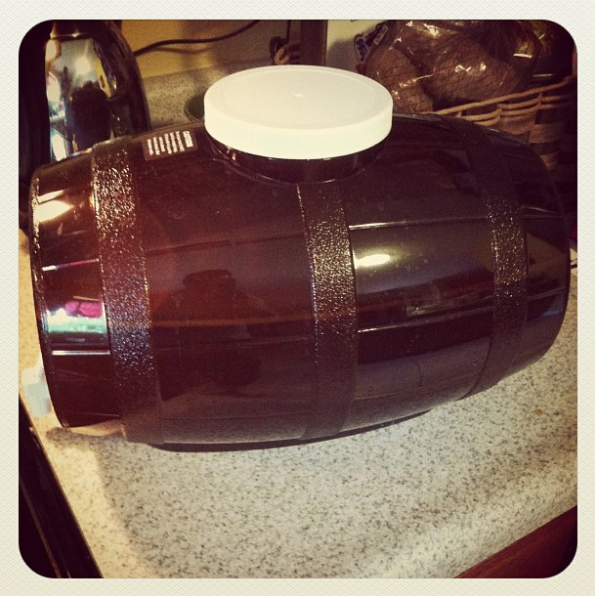
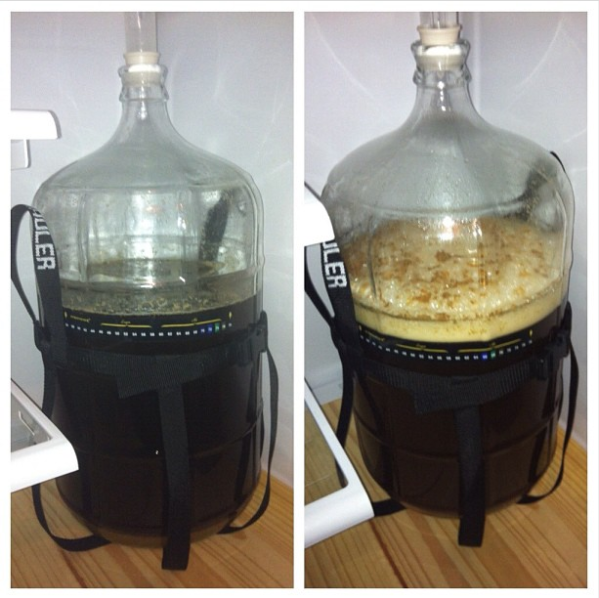
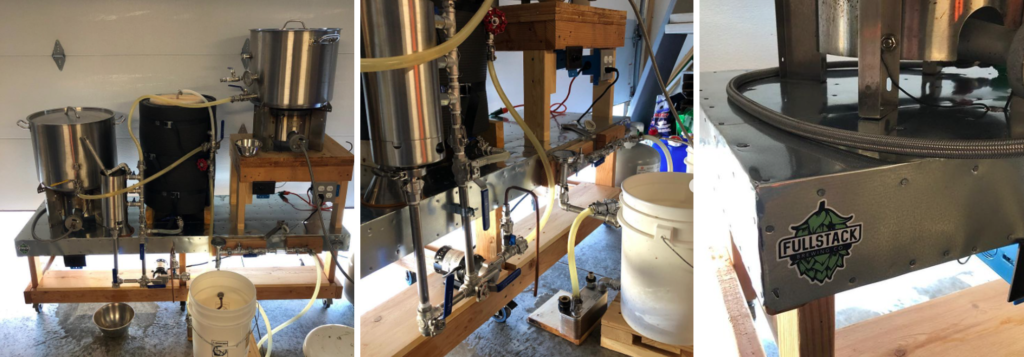

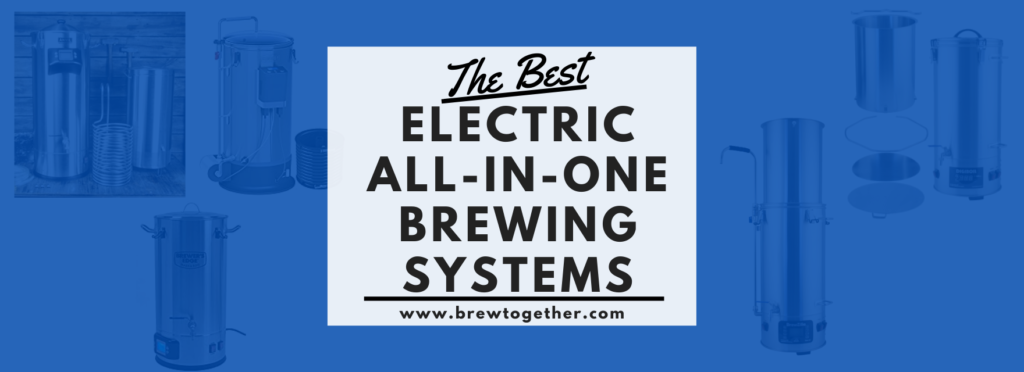
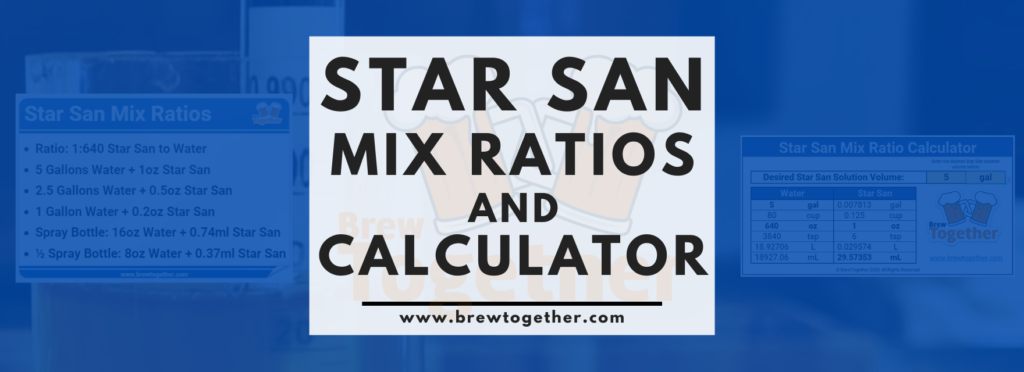

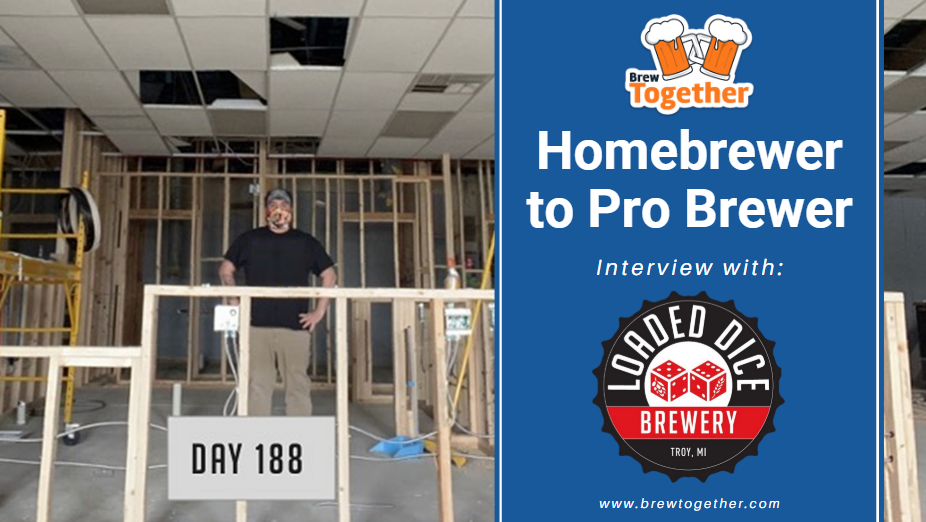
Responses